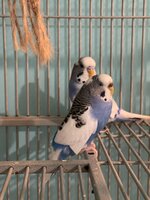Bunchobird
Sprinting down the street
Hello, I have their Nest box shipping to my house within this week.
I will attach a photo of my pair, The male and female have recently (within the last 6 months) become sexually mature, both been vet checked and have gotten a thumbs up to proceed!
I was thinking for their first clutch, I Don't know if they will make good parents (lol) so i bought some dummy eggs and was thinking to replace all eggs but two so that i don't hatch out 8 and them abandon them. I don't want to be stuck hand-feeding 8 babies. I have prior hand-feeding experience with finches but it is SO hard! Is this a smart idea or just let nature take it's course if they abandon them?
Any other breeding tips? Bedding to use? What do i do if my female won't stop laying after she has her clutch? What foods are calcium enriched? How to encourage breeding? take the eggs out to candle or not (asking since it will be her first clutch)? is candling budgie eggs not good in general? Ways to control aggressive behaviour if changing food and water becomes an issue? How to encourage successful mating? dietary supplements to use (powder or liquid form) to enhance crop milk? When should babies fledge, and if they don't what to do? After raising her clutch, if she doesn't stop laying, what can I do to prevent egg laying and sexual behavior?
Any other things that I need to know before I breed and may make me change my mind (other than the fact that it is a big responsibility, and takes time, money, and effort).
sorry for so many questions, I am trying to be the best prepared I can.
You don't have to have answers to them all to answer!

I will attach a photo of my pair, The male and female have recently (within the last 6 months) become sexually mature, both been vet checked and have gotten a thumbs up to proceed!
I was thinking for their first clutch, I Don't know if they will make good parents (lol) so i bought some dummy eggs and was thinking to replace all eggs but two so that i don't hatch out 8 and them abandon them. I don't want to be stuck hand-feeding 8 babies. I have prior hand-feeding experience with finches but it is SO hard! Is this a smart idea or just let nature take it's course if they abandon them?
Any other breeding tips? Bedding to use? What do i do if my female won't stop laying after she has her clutch? What foods are calcium enriched? How to encourage breeding? take the eggs out to candle or not (asking since it will be her first clutch)? is candling budgie eggs not good in general? Ways to control aggressive behaviour if changing food and water becomes an issue? How to encourage successful mating? dietary supplements to use (powder or liquid form) to enhance crop milk? When should babies fledge, and if they don't what to do? After raising her clutch, if she doesn't stop laying, what can I do to prevent egg laying and sexual behavior?
Any other things that I need to know before I breed and may make me change my mind (other than the fact that it is a big responsibility, and takes time, money, and effort).
sorry for so many questions, I am trying to be the best prepared I can.
You don't have to have answers to them all to answer!


